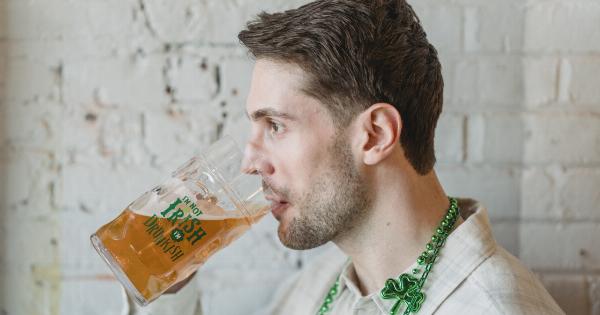Alcohol consumption is widely accepted and embraced in many cultures around the world. However, it is important to recognize when casual drinking has transformed into a more serious issue.
Excessive and problematic drinking can lead to dire consequences for both physical and mental health.
1. Craving for Alcohol
If you find yourself constantly thinking about alcohol and experiencing an intense urge or craving to consume it, this can be an early warning sign of a potential drinking problem.
The inability to control these cravings often leads to regular and excessive alcohol consumption.
2. Increased Tolerance
Developing a higher tolerance for alcohol means needing to consume larger quantities to achieve the desired effect.
If you find that you are now able to drink significantly more alcohol without feeling the same level of intoxication as before, it’s a clear indication that your body has become accustomed to high levels of alcohol.
3. Neglected Responsibilities
One of the telltale signs of a drinking problem is neglecting important responsibilities or experiencing a decline in performance at work, school, or in personal relationships.
This can manifest as frequent tardiness, increased absenteeism, or consistently underperforming due to alcohol-related issues.
4. Failed Attempts to Cut Down
If you have made multiple attempts to cut down on your alcohol consumption but have been unsuccessful, it may be an indication that you have developed a drinking problem.
The inability to control or limit your drinking despite genuine efforts contradicts a healthy relationship with alcohol.
5. Physical Withdrawal Symptoms
When someone becomes physically dependent on alcohol, attempting to quit or reduce consumption can cause withdrawal symptoms. These symptoms range from mild to severe and may include restlessness, irritability, nausea, insomnia, and even hallucinations.
Experiencing withdrawal symptoms is a clear indication of a drinking problem.
6. Neglected Hobbies and Interests
If you notice yourself losing interest in activities or hobbies that were once pleasurable and meaningful to you, and your primary focus becomes drinking instead, it can be a warning sign of a drinking problem.
Neglecting hobbies can also indicate that alcohol has taken priority over other aspects of your life.
7. Increased Isolation
Alcohol can often become a solitary vice, causing individuals to withdraw from social activities and spend more time alone. This isolation is often driven by a desire to hide drinking habits, fearing judgment or intervention from loved ones.
If you find yourself increasingly isolating yourself from others, it may be a sign of a drinking problem.
8. Relationship Struggles
Excessive alcohol consumption can significantly strain personal relationships. Frequent arguments, dishonesty, and broken promises can all be attributed to the interference of alcohol in relationships.
If your loved ones express concern about your drinking habits or are consistently unhappy with your behavior while under the influence, this should not be ignored.
9. Legal Issues
Involvement in legal issues related to alcohol, such as drunk driving or public intoxication charges, is a major red flag for problematic drinking.
These legal consequences can have long-lasting effects on personal and professional life, highlighting the need to address the underlying drinking problem.
10. Continued Drinking Despite Negative Consequences
One of the most significant red flags that suggest a drinking problem is persistent alcohol consumption despite experiencing negative consequences.
These consequences can range from physical health issues to strained relationships, financial difficulties, or even job loss. If you consistently prioritize alcohol over these negative outcomes, it is time to acknowledge and address the problem.































